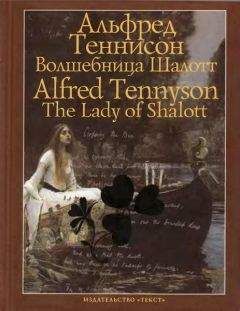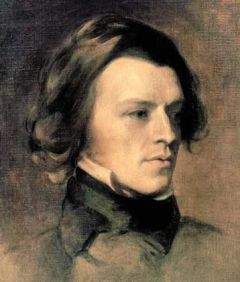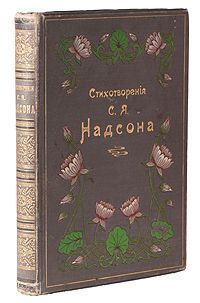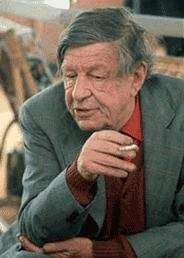SIR GALAHAD
My good blade carves the casques of men,
My tough lance thrusteth sure,
My strength is as the strength of ten,
Because my heart is pure.
The shattering trumpet shrilleth high,
The hard brands shiver on the steel,
The splinter’d spear-shafts crack and fly,
The horse and rider reel:
They reel, they roll in clanging lists,
And when the tide of combat stands,
Perfume and flowers fall in showers,
That lightly rain from ladies’ hands.
How sweet are looks that ladies bend
On whom their favours fall!
For them I battle till the end,
To save from shame and thrall:
But all my heart is drawn above,
My knees are bow’d in crypt and shrine:
I never felt the kiss of love,
Nor maiden’s hand in mine.
More bounteous aspects on me beam,
Me mightier transports move and thrill;
So keep I fair thro’ faith and prayer
A virgin heart in work and will.
When down the stormy crescent goes,
A light before me swims,
Between dark stems the forest glows,
I hear a noise of hymns:
Then by some secret shrine I ride;
I hear a voice but none are there;
The stalls are void, the doors are wide,
The tapers burning fair.
Fair gleams the snowy altar-cloth,
The silver vessels sparkle clean,
The shrill bell rings, the censer swings,
And solemn chaunts resound between.
Sometimes on lonely mountain-meres
I find a magic bark;
I leap on board: no helmsman steers:
I float till all is dark.
A gentle sound, an awful light!
Three angels bear the holy Grail:
With folded feet, in stoles of white,
On sleeping wings they sail.
Ah, blessed vision! blood of God!
My spirit beats her mortal bars,
As down dark tides the glory slides,
And star-like mingles with the stars.
When on my goodly chaiger borne
Thro’ dreaming towns I go,
The cock crows ere the Christmas morn,
The streets are dumb with snow.
The tempest crackles on the leads,
And, ringing, springs from brand and mail;
But o’er the dark a glory spreads,
And gilds the driving hail.
I leave the plain, I climb the height;
No branchy thicket shelter yields;
But blessed forms in whistling storms
Fly o’er waste fens and windy fields.
A maiden knight — to me is given
Such hope, I know not fear;
I yearn to breathe the airs of heaven
That often meet me here.
I muse on joy that will not cease,
Pure spaces clothed in living beams,
Pure lilies of eternal peace,
Whose odours haunt my dreams;
And, stricken by an angel’s hand
This mortal armour that I wear,
This weight and size, this heart and eyes,
Are touch’d, are turn’d to finest air.
The clouds are broken in the sky,
And thro’ the mountain-walls
A rolling organ-harmony
Swells up, and shakes and falls.
Then move the trees, the copses nod,
Wings flutter, voices hover clear:
‘O just and faithful knight of God!
Ride on! the prize is near.’
So pass I hostel, hall, and grange;
By bridge and ford, by park and pale,
All-arm’d I ride, whate’er betide,
Until I find the holy Grail.
Мой добрый меч крушит булат,
Копье стремится в бой;
Я силой десяти богат —
Поскольку чист душой.
Высок и ясен трубный гуд,
Дрожат клинки, ударив в бронь;
Трещат щиты; вот-вот падут
И верховой, и конь.
Вспять прянут, съедутся, гремя;
Когда ж стихает битвы гам,
Дожди духов и лепестков
Роняют руки знатных дам.
Сколь нежный взор они дарят
Тем, кто у них в чести!
От плена и от смерти рад
Я дам в бою спасти.
Но, внемля зову высших нужд,
Я чту удел Господних слуг;
Я поцелуям страсти чужд,
И ласкам женских рук.
Иных восторгов знаю власть,
Провижу свет иных наград;
Так веры путь, молитвы суть
Мне сердце в чистоте хранят.
Едва луна сойдет с небес,
Свет различит мой взор:
Промеж стволов мерцает лес,
Я слышу гимнов хор.
Миную тайный склеп: внутри
Услышу глас; в проеме врат
Все пусто: немы алтари,
Ряды свечей горят.
Мерцает белизной покров,
Лучится утварь серебром,
Струит амвон хрустальный звон,
Звучит торжественный псалом.
Порой в горах у хладных вод
Мне челн дано найти.
Всхожу; не кормчий челн ведет
По темному пути.
Слепящий отблеск, звук струны!
Три ангела Святой Грааль
Уносят, в шелк облачены,
На сонных крыльях вдаль.
О чудный вид! Господня кровь!
Душа из клетки рвется прочь,
Но гордый знак скользит сквозь мрак
Ночной звездой вливаясь в ночь.
Когда на добром скакуне
Я мчусь сквозь спящий град,
Петух рождественской луне
Поет; снега лежат.
Град по свинцовым крышам бьет,
Звеня, сечет доспех и щит,
Но дивный луч из тьмы встает
И тучи золотит.
Спешу я в горы от равнин —
К скале, открытой всем ветрам, —
Но вихрь грез в кипенье гроз
Скользит по топям и полям.
Безгрешный рыцарь — я живу
Надеждой; страх исчез.
Я жду, тоскуя, наяву
Вдохнуть ветра небес,
Узнать блаженство вне преград,
В лучистом зареве края;
Недвижных лилий аромат
Во сне вдыхаю я.
Касаньем ангельской руки
Броня, что мне доверил мир,
Доспех и меч, плоть рук и плеч —
Все обращается в эфир.
Расступится завеса туч;
Средь каменных высот
Органа гул, высок, могуч,
Взметнется и падет.
Лес гнется, никнет сень осин,
Бьют крылья, шепчут облака:
«О верный Божий паладин,
Скачи же! Цель близка!»
Вот так, минуя двор и сад,
И мост, и брод, скачу я вдаль,
Влеком вперед, из года в год,
Пока не отыщу Грааль.
Д. Катар
At Francis Allen’s on the Christmas-eve, —
The game of forfeits done — the girls all kiss’d
Beneath the sacred bush and past away —
The parson Holmes, the poet Everard Hall,
The host, and I sat round the wassail-bowl,
Then half-way ebb’d: and there we held a talk,
How all the old honour had from Christmas gone,
Or gone, or dwindled down to some odd games
In some odd nooks like this; till I, tired out
With cutting eights that day upon the pond,
Where, three times slipping from the outer edge,
I bump’d the ice into three several stars,
Fell in a doze; and half-awake I heard
The parson taking wide and wider sweeps,
Now harping on the church-commissioners,
Now hawking at Geology and schism;
Until I woke, and found him settled down
Upon the general decay of faith
Right thro’ the world, ‘at home was little left,
And none abroad: there was no anchor, none,
To hold by.’ Francis, laughing, clapt his hand
On Everard’s shoulder, with ‘I hold by him.’
‘And I,’ quoth Everard, ‘by the wassail-bowl.’
‘Why yes,’ I said, ‘we knew your gift that way
At college: but another which you had,
I mean of verse (for so we held it then),
What came of that?’ ‘You know,’ said Frank, ‘he burnt
His epic, his King Arthur, some twelve books’ —
And then to me demanding why? ‘Oh, sir,
He thought that nothing new was said, or else
Something so said ’twas nothing - that a truth
Looks freshest in the fashion of the day:
God knows: he has a mint of reasons: ask.
It pleased me well enough.’ ‘Nay, nay,’ said Hall,
‘Why take the style of those heroic times?
For nature brings not back the Mastodon,
Nor we those times; and why should any man
Remodel models? these twelve books of mine
Were faint Homeric echoes, nothing-worth,
Mere chaff and draff, much better burnt.’ ‘But I,’
Said Francis, ‘pick’d the eleventh from this hearth
And have it: keep a thing, its use will come.
I hoard it as a sugar-plum for Holmes.’
He laugh’d, and I, tho’ sleepy, like a horse
That hears the corn-bin open, prick’d my ears;
For I remember’d Everard’s college fame
When we were Freshmen: then at my request
He brought it; and the poet little urged,
But with some prelude of disparagement,
Read, mouthing out his hollow oes and aes,
Deep-chested music, and to this result.
У Фрэнка Аллена, под Рождество,
Покончив с фантами и всех девиц
(Уже ушедших) перецеловав,
Сидели мы одни: я, пастор Холмс,
Поэт Эверард Холл и сам хозяин —
Вкруг чаши пуншевой, почти пустой,
И разговор вели не торопясь —
О том, что праздник Рождества померк
Иль выродился в скучный ритуал
Пустых забав; а я, уставши днем
Выписывать восьмерки на пруду,
Где пару раз так треснулся об лед,
Что выбил звезды, — малость задремал
И смутно слышал, как, входя в азарт,
Священник то хвалил епископат,
То геологию бранил в сердцах,
И наконец, когда я вновь проснулся,
Гудел про общий недостаток веры:
«У нас еще осталось кое-что,
Но за границей — голо; нет основы,
Чтоб за нее держаться». Фрэнк, смеясь,
Похлопал Эверарда по плечу:
«Я за него держусь». А Эверард:
«А я — за эту пуншевую чашу».
«Ну, да, — заметил я, — еще в колледже
Мы знали за тобой такой талант;
Но у тебя был и другой — к стихам,
Что вышло из него?» — «Как, ты не знаешь? —
Воскликнул Фрэнк. — Он сжег свою поэму:
Король Артур, в двенадцати частях».
И, отвечая на вопрос безмолвный,
Добавил: «Он сказал, что эта тема
Стара, а истина должна ходить
Одетою по современной моде.
Ты сам его спроси. По мне, поэма
Была вполне недурственная». — «Вздор! —
Отрезал Холл. — Кому нужны легенды
О героических веках? То время
Ушло, как мамонт. До которых пор
Жить в долг у старины? Моя поэма
Была гомеровским неверным эхом,
Мякиной, годной только для огня».
«Но я одну из песен, — молвил Фрэнк, —
Успел спасти из пламени. Уверен,
Ее черед настанет. Пусть лежит,
Как леденцы имбирные для Холмса».
Фрэнк засмеялся. Я же, полусонный,
Вдруг уши навострил, как жеребец,
При скрипе яслей: Холл был знаменит
У нас на первом курсе. Я взмолился,
И рукопись была принесена.
Поэт отнекивался для порядка,
Потом с пренебреженьем взял тетрадь
И стал, растягивая «о» и «а»,
Гудеть стихи. И вот что получилось.
Г. Кружков




